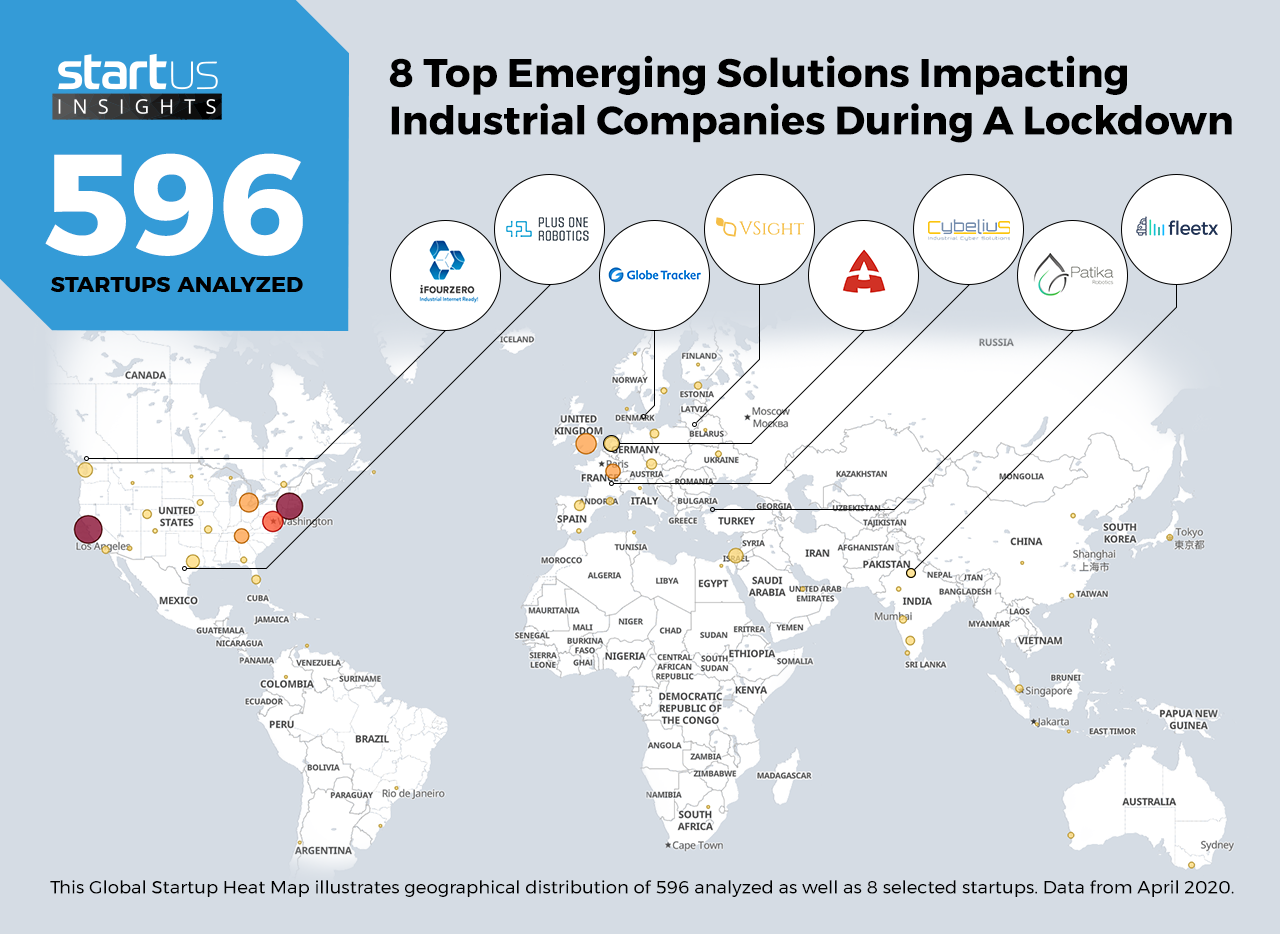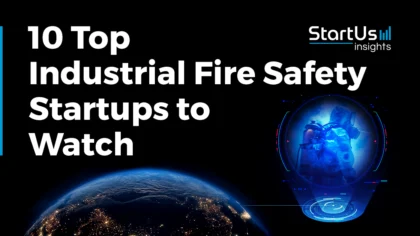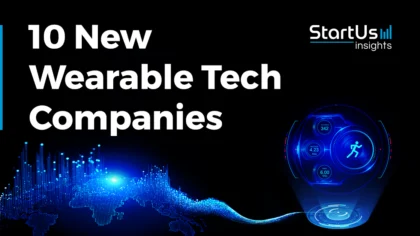Our Innovation Analysts recently looked into emerging technologies and up-and-coming startups working on solutions that help maintain industry activity and operations during the coronavirus lockdown.
Heat Map: 8 Top Emerging Solutions Impacting Industrial Companies
We use a data-driven startup scouting approach to identify the most relevant solutions globally. The Global Startup Heat Map below highlights 8 interesting examples out of 596 relevant solutions. We analyzed technology-driven solutions that ease the burden of the lockdown for industrial companies worldwide. Globe Tracker, fleetx, Patika Robotics, VSight, iFourZeo Technologies, Plus One Robotics, Aziobot, and Cybelius develop 8 top solutions to watch out for!
iFourZero Technologies – Digital Factory
During pandemics, such as the Coronavirus pandemic, many factories face a decrease or cessation of their production activities. Since it is impractical to travel to facilities regularly to check the condition of equipment, startups develop digital factory solutions. Emerging technologies like the digital twin aim to create a copy of an existing factory and enrich it with the internet of things (IoT). Networks, sensors and data analytics facilitate real-time remote management & assistance, predictive maintenance, and information flow.
Canadian startup iFourZero Technologies blends industrial IoT (IIoT), big data, powerful analytics, and machine learning to build a digital factory based on real assets. This digital twin solution promotes the adoption of Industry 4.0 practices, as well as enables management of remote digitized factory performance and controls in real-time.
Plus One Robotics – Human-in-the-Loop Technology (HITL)
Emerging technologies in Human-in-the-Loop bring lots of benefits for coronavirus-affected industrial facilities. Using artificial intelligence (AI), computer vision, and automation & supervision software, industrial workers delegate their routine tasks to robots and direct their activities remotely. Besides, the robots undergo rounds of constant human feedback and learning. This makes it possible for them to master skills and acquire more complex functions.
The US-based startup Plus One Robotics develops Yonder, a HITL remote robot supervision software. The solution allows orchestrating the work of multiple industrial robots from a location-independent environment. In addition, the solution supports a human-centered design and provides user-centric data encryption.
Globe Tracker – Real-Time Supply Chain Monitoring
These days, industrial companies are experiencing a coronavirus-induced supply chain slow-down. Due to specific country-level limitations, misinformation, miscommunication, and lack of transparency, it becomes difficult to strategically manage global supply chains. Startups develop real-time monitoring and mapping for supply chains that increase visibility and safety, track customer demands for inventories, streamline transportation capacities and allow for real-time route changes.
Danish startup Globe Tracker creates a sensor-based telematics platform to improve the visibility of supply chains across various industries, including transportation. This enables real-time connectivity at every stage, monitors various shipment parameters like dwell time, regulation compliance, and deviations, to provide users with updated information. The company’s solution potentially extends support to the industry during a lockdown for better decision-making.
VSight – Augmented Reality (AR) Collaborations
Augmented reality applications possess a great potential to support uninterrupted industrial production with limited on-site workers during a lockdown. Technicians or inexperienced laborers receive remote AR-enabled guidance from experts, who are not required to physically be present at the factory. Mediated by remote assistance software, virtual overlays, AR projections, and symbols, location-agnostic industrial teams manage to collaborate and maintain factory operations.
Lithuanian startup VSight achieves a more connected workforce via its VSight Remote Platform. The solution incorporates AR-enhanced wearables, in the form of headsets, and mobile software into factories’ daily operations. In addition, the technology facilitates remote team collaborations and expert assistance using adaptive screen sharing, AR annotations, and virtual surface drawing technologies.
Aziobot – Industrial Cleaning
With lockdowns enforced in most places, factories search for novel ways to keep their facilities clean, given the reduced workforce. Robots are capable of cleaning factory floors and surfaces of dust, grime, and industrial residues. Equipped with route planning and task automation, they clean these suddenly hazardous workspaces efficiently and safely. Besides, industrial cleaning robots tackle disinfection and paint removing tasks.
Dutch startup Aziobot manufactures fully autonomous floor cleaning robots for industry, warehouses, and commercial facilities. The robots feature a fast-charging battery to cover a large area with a relatively easy setup. Refined AI algorithms guide the Aziobot to help users achieve time and cost-efficiency while cleaning during lockdowns.
Cybelius – Industrial Cybersecurity
The current situation makes industries more vulnerable to hackers and cyberthreats forcing modern factories to ensure that they are not exposed. Startups across the world work to address all layers of industrial cybersecurity. These include supervisory control & data acquisition (SCADA) servers and human-machine interfaces as well as networks and access management. This creates sophisticated detection, assessment, and response systems lowering the impact of potential cyberattacks to enhance industrial cybersecurity.
French startup Cybelius develops complex cybersecurity solutions to protect SCADA and industrial control system (ICS) networks for industry and infrastructure. It employs a combination of risk analysis, OT & IT separation, and remote access security. In addition, the startup’s solutions monitor and protect networks from cyberattacks in real-time, map multiple levels, and identify vulnerabilities.
Patika Robotics – Industrial Autonomous Vehicles
Adapting autonomous vehicles (AVs) to aid humans in performing everyday tasks in a factory or plant is a viable solution for reduced workers during pandemics. Self-driving machines assist in material handling, leaving room for only critical staff to control the process and work alongside AVs. As a result, the risk of virus transmission at the factory is reduced.
Turkish startup Patika Robotics manufactures autonomous vehicles for industry and agriculture. Patika’s industrial autonomous vehicles PTK1000 and PTK3000 handle up to 1.000 and 3.000 kg (2.200 lb/ 6.613 lb) loads respectively. Both autonomous vehicles work indoors and outdoors while automatically managing their charging requirements. Thanks to integrated LiDARs, cameras, and emergency systems, these robots also maintain workplace safety.
fleetx – Fleet Management
During crises, it is vital for fleets to stay operational to maintain a reasonable cost to revenue balance, in terms of material & product deliveries and fleet operations. Today’s fleet management technologies cut costs and increase productivity for manufacturing and warehousing companies. This is done by continuously tracking vehicle parameters, scheduling maintenance and repair, monitoring drivers’ behavior, as well as managing documentation in remote teams.
Indian startup fleetx develops a location-agnostic GPS-based platform for fleet health and performance monitoring along with real-time analytics. The solution assists managers in predictive maintenance, app-based vehicle inspections, safety alert configurations, and simultaneous in-cab coaching and voice chat.
How To Flatten The Curve?
This is an unprecedented situation for many of us across the world. The SARS outbreak in the early 2000s claimed 774 lives. That toll was enough to drive research & development and easier healthcare solutions. The fact that several mobile health, e-health, diagnostics, and remote health startups and companies are able to respond during a real epidemic is encouraging. With thousands of deaths already, we expect to see numerous new companies offering technology-driven solutions to help doctors, nurses, other health workers, and the larger public.









